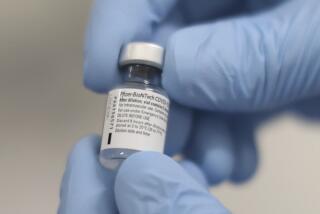ICN Plans Test of Anti-Viral Drug for AIDS : 350 Patients at 8 Hospitals to Participate in Research
- Share via
ICN Pharmaceuticals Inc. of Costa Mesa announced Wednesday that it is planning to test its anti-viral drug Virazole on 350 pre-AIDS patients at eight medical centers throughout the United States, one of the largest research projects proposed on the deadly disease.
The study proposal comes just a few months after ICN said initial results of a study of 23 patients in New York who have been exposed to AIDS and have developed some of its symptoms showed Virazole could “cause a reduction in the virus’s activity and enhance the (body’s) immune system.” Most scientists believe the virus HTLV-III is the probable cause of acquired immune deficiency syndrome.
By expanding the number of patients in its Virazole testing, ICN enters the so-called “second phase” of human clinical testing required by the U.S. Food and Drug Administration before any new drug can be approved for sale.
The latest research project, which must have FDA approval before it can start, will be jointly sponsored by Eastman Kodak Co., the Rochester, N.Y. giant that owns a 5% stake in ICN and co-sponsors a research institute on anti-viral drugs with ICN.
Representatives of both companies said Kodak’s role in the AIDS research would be greater than just helping to defray the expected $10-million cost of developing the proposed project. However, the officials were unable to define precisely how Kodak would participate.
The research, scheduled to begin as soon as FDA approval is received, would last between 24 and 28 weeks at each of eight medical centers. Those participating include The New York University/Cornell Medical Center in New York City; M.D. Anderson Hospital in Houston; UC San Diego Medical Center; Miami University in Florida and the Los Angeles County-USC Medical Center.
An ICN official said participating physicians have already started to select patients to participate in the study. Dr. Karl M. Johnson of Johns Hopkins University in Baltimore will coordinate the research.





